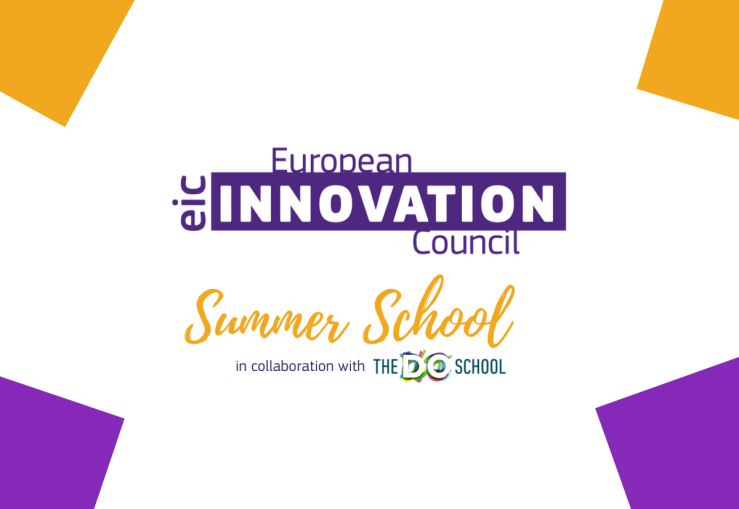The pandemic brought global uncertainty, transforming how businesses run and how leaders lead. The silver lining is that uncertainty can create opportunities – especially for companies that survive and innovate from the unexpected. But how can businesses reinvent themselves in times of crisis? During the past five weeks, the European Innovation Council offered an online EIC Summer School focusing on several challenges with dedicated training sessions. In partnership with The DO School, the EIC Community events provided tools and key lessons on leveraging capabilities, moving quickly, and maximising teams through crisis and change. Here’s the wrap-up of this Summer learning experience.
The Digital journey
Over the past five weeks, every Friday morning, innovative EIC startups joined the EIC Summer School Sessions to learn more about pivoting, problem-solving and adjusting to adversity. The first training session was focused on Social Media presence, providing tips and tools to help the participants with their digital branding.
During the workshop held on 17 July, the EIC Coaches Oana Popescu and Jasper Havermans combined short sessions of applied theory with case studies on B2C and B2B communication, exploring the professional and personal experiences of the audience. Some participants were already active on social media and showed their skills during the event. For others, this training represented the first step to work on their digital marketing strategy:
“When I saw this training on Social Media, I immediately signed up. I think the right social media presence is very important, but our company doesn’t have a Social Media strategy as part of our Marketing strategy. Thanks to this training, it’s clear for me that we should start implementing it”, said Alexandra Kurz, the product manager of VB Devices. “Today I know where I need to start with my research to make better use of our Social Media accounts. I really liked the statistics and graphs, showing us when it’s the right time to post and the differences between the platforms”, she added.
Effective leadership
COVID-19 also forced countless startups to step up on several fronts. Business leaders had to ensure the health, safety, and wellbeing of their employees, developing both practical solutions and breakthrough innovations to succeed with their companies in “a new normal reality”. During the second training, the EIC Summer School focused on the importance of effective leadership in times of crisis.
There are many comparisons drawn between top athletes and successful business leaders. Both need to demonstrate confidence, motivation, persistence and focus. On 24 July, the EIC Coaches Eléonore Venin and Virginie Vinel Kolovos explored these sporting analogies for business leaders, providing tools that are usually used to overcome a crisis in sports. Each major concept was illustrated by an analysis of a high-level sport situation and the parallel with the business world was orchestrated with numerous activities. At the end of the session, one of the participants highlighted:
“A leader needs to emerge in these moments. I already scheduled a new meeting with my team because I realised that it’s important to give a deeper perspective. Sometimes we forget that they don’t have the same pains and concerns that we have, and I want to motivate them and make them feel more part of our company”, explained the founder of the Spanish company i4life, Marian Garcia-Prieto.
Business resilience
The last three sessions were organised in partnership with The DO School. The coach, Scott Goldner, presented a 3-step journey for entrepreneurs. On 31 July, during the session “From Passion to Purpose”, the participants received new skills and mindsets to formulate the purpose of their companies and use it as a driver for employee’s satisfaction and business success.
For Ana Ferreira, Business Development Manager of the company BestHealth4U, these insights represented an important first step to develop an unexplored business-side: “I don’t have any business background, so this was a great way of starting”, said Ana. “Exploring ways to organise your ideas and structure what you feel to boost that into a company or a product, it’s very interesting. We are a very young team and this knowledge is very useful from an HR-perspective”.
On 7 August, the training “From Crisis to Opportunity” focused on the crisis readiness of the businesses, developing a roadmap of crisis response actions with many tips provided by The Do School: “It’s important to think about scorecards on crisis readiness. Constantly look at your venture, your operating system and try to be more human-focused, be less bureaucratic… Don’t overcomplicate even with something as complicated as crisis readiness”, explained Scott Goldner to the participants of the session.
Last but not least, on 14 August the workshop used a tool to identify the individual mindsets, team conditions, and organisational culture & ways of working to succeed in the long-term. During the training “Build to Last”, the participants were divided into three breakout rooms and had to share their main challenges with the groups, exploring a peer coaching process with a reflection on the next steps. The participant Marian Garcia-Prieto also emphasised the peer-to-peer learning experience and the Community collaborations built during these events:
“We’re a young company, with connections only in Spain. We participated in the EUvsVirus and now in this Summer School, and I already gained many connections in Europe. It made me feel even more European than before, and it’s opening doors for us”, she added.
Are you interested in receiving tailored business trainings with experts? The Community Events and Trainings are a regular part of the European Innovation Council Business Acceleration Services. Keep your eyes on our EIC Community and Calendar for further details!

DISCLAIMER: This information is provided in the interest of knowledge sharing and should not be interpreted as the official view of the European Commission, or any other organisation.

